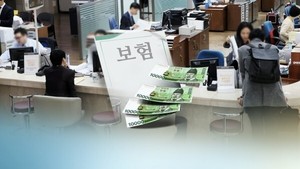
[뉴스워치= 문다영 기자] It was found that foreign alternative investments by domestic insurance companies realized interest and dividend income by the end of September last year. Accordingly, the Financial Supervisory Service plans to observe the possibility of insolvency, such as prolonged economic recession, and focus on management and supervision.
On the 22nd, the Financial Supervisory Service announced on the 22nd that it will disclose the status of overseas alternative investment by insurance companies and the direction of future supervision, check and monitor the risk level of each type of overseas alternative investment by insurance companies, and establish and implement the’best practice standards for managing alternative investment risk for insurance companies’ during the first half of this year Etc. said about the direction of the director. This is because some assets were lost due to the Corona 19 last year, and it was judged that the damage could be even greater if the economic recession prolonged.
According to the Financial Supervisory Service, at the end of September of last year, the amount of overseas alternative investment for insurance companies was 70.4 trillion won. It was found that there were many indirect investments, such as fund purchases, rather than direct investment, at around 6.5% of total assets. The alternative investment types are real estate-related investments of 24.100 trillion won, SOC 20 trillion won, and corporate acquisition and restructuring investments of 9.30 trillion won.
The targets of investment were offices: 1.09 trillion won, power generation and energy 8.5 trillion won, aircraft and ships 4.900 trillion won, and acquisition financing of PEFs 4.900 billion won, and the investment areas are mainly developed countries, the United States (26,800 billion won). , The UK (6.5 trillion won) and France (2.7 trillion won). 63.4% of overseas real estate investment invested in offices, hotels, and complex facilities was concentrated in the US.
The resulting interest and dividend income was 2 trillion won, which had been realizing profits until September of last year, but a total of 1944 billion won in losses occurred in some assets such as investment funds in overseas real estate and aviation sectors due to the corona 19 effect. The Financial Supervisory Service diagnosed that the loss could continue to expand.
In fact, overseas alternative investment in the insurance industry expanded rapidly before the pandemic occurred. As a result, it was reported that the exposure to foreign alternative investment by domestic insurance companies increased by 5 trillion won in one and a half years.
Experts also diagnosed that insurance companies were concentrating on foreign alternative investments in a short period of time, raising the risk of investment.However, according to the recent earnings disclosures of insurance companies, some insurance companies recorded good results in Korea, but their profits declined due to the loss of overseas alternative investments.
In the case of KB Insurance, the auto insurance loss ratio decreased to 85%, raising expectations for earnings, but net income decreased by 30% due to the provision for losses from US hotel investments. It is known that Lotte Insurance’s investment income decreased by 181.6 billion won compared to the previous year due to investment losses such as aircraft and hotels, and Mirae Asset Life Insurance also showed a decrease in operating profit due to a decrease in the valuation of overseas assets, such as investments in funds holding real estate in Brazil.
The current status of overseas alternative investment by insurance companies is also unsafe. Although there has not been any investment loss yet, assets with signs of insolvent such as bankruptcy of borrowers and delays or suspension of construction also amounted to 2721 billion won (0.4% of overseas alternative investment). Offices, shopping malls, hotels, etc., which were greatly affected by Corona 19, such as interest rate cuts, maturity extensions, and rent reductions, accounted for 1.4% of overseas alternative investments, but their profitability worsened compared to the original expected returns.
New investment also appears to be shrinking after 2018. Corona 19 has significantly decreased in 2020, and in the case of overseas alternative investment maturing this year, 2 trillion won out of a total of 4.4 trillion won is real estate-related investment, and exit risk exists when the conditions for rental and sale deteriorate.
Accordingly, the Financial Supervisory Service plans to reinforce the inspection standards related to alternative investment in the management status evaluation of insurance companies, and to differentiate soundness supervision according to the risk of each type of investment.
Based on the best practices identified as a result of the insurance company’s self-inspection, the plan is to develop best practices for risk management in the first half of this year, and to clarify guidelines for deliberation procedures such as local due diligence and high-risk alternative investments to increase practical use.
As a part of strengthening the soundness evaluation and inspection of alternative investments, it has announced that it will examine the soundness classification of the same investment by insurance company and differences in recognition of losses, and provide guidance on the soundness of securities in consideration of signs of insolvent.
In addition, when an external auditor audits the settlement of accounts, it is expected to strengthen inspections such as strict fair value evaluation, loss recognition, and adequate provisioning for alternative investment assets.
The Financial Supervisory Service plans to intensively manage the soundness status and insolvency of insurance companies with a high proportion of alternative investments and weak internal controls. In order to check the current status on a regular basis, alternative investment business reports are newly established and operated, and whether it is insolvency is managed monthly, and business reports are being revised for more precise analysis.
Reporter Moon Da-young [email protected]
